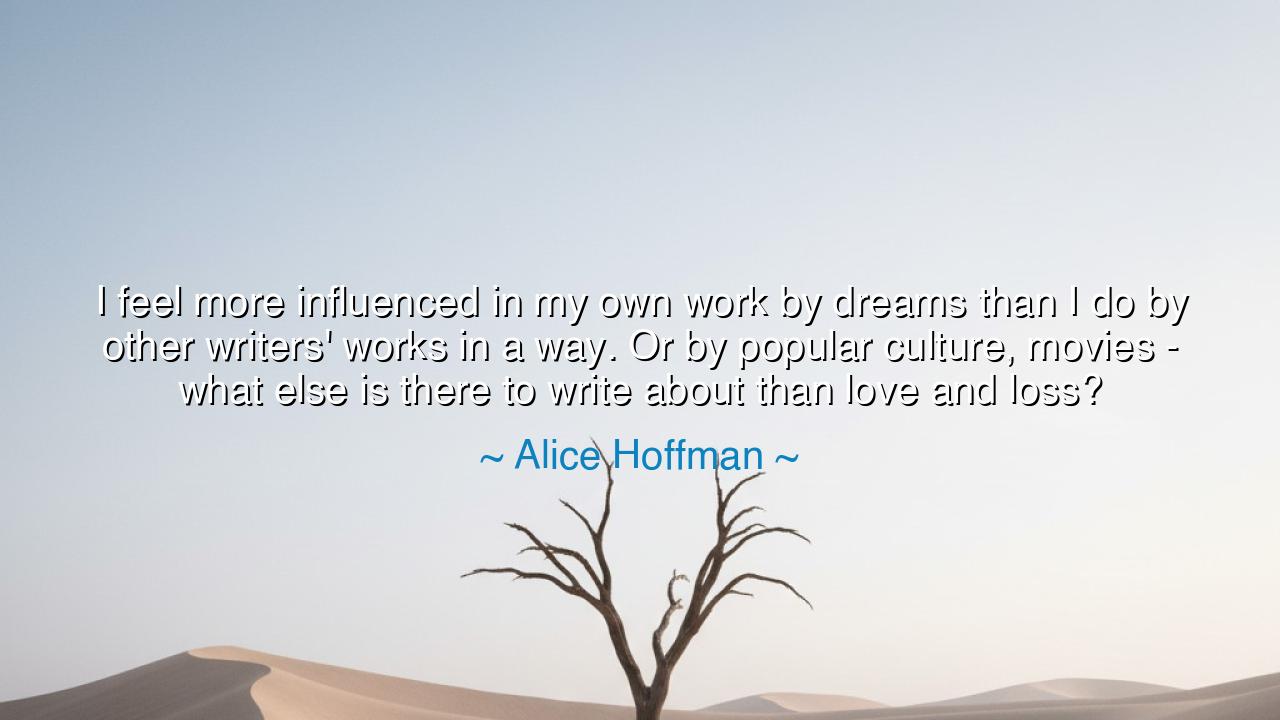
I feel more influenced in my own work by dreams than I do by
I feel more influenced in my own work by dreams than I do by other writers' works in a way. Or by popular culture, movies - what else is there to write about than love and loss?






The words of Alice Hoffman, poet of the mystical and chronicler of the human heart, shimmer with quiet truth: “I feel more influenced in my own work by dreams than I do by other writers' works in a way. Or by popular culture, movies — what else is there to write about than love and loss?” In these words, she reveals the twin sources of her creative power: the world of dreams, which speaks in symbols and whispers, and the eternal realities of love and loss, which shape every soul that walks the earth. Hoffman speaks not merely as a writer, but as one who listens — who listens to the secret language of the heart and the hidden voice of the night. She reminds us that true art is not imitation, but revelation — that it springs not from what we consume, but from what we remember, feel, and dream.
The origin of her thought lies in her craft itself. Known for weaving realism with the magical, Hoffman has long explored how ordinary life is touched by mystery. Her stories are filled with enchantment, yet their power does not come from the fantastical, but from the emotional truth that lies beneath it. To say she is influenced more by dreams than by other writers is to say that she draws from her own inner well rather than from the voices of the crowd. The dream, to her, is the purest form of inspiration — untouched by fashion, undiluted by imitation. In this she stands among the timeless artists who have understood that creativity is not learned, but remembered — it arises from the soul’s dialogue with its own depths.
Dreams are the ancient storytellers of humankind. Long before books or theater, before language itself, our ancestors sat beneath the stars and spoke of the visions they saw in sleep — visions of love found and lost, of death, of wonder, of the gods walking among men. To be influenced by dreams, as Hoffman declares, is to be in conversation with that ancient lineage, to let the unconscious mind speak its truth through symbol and metaphor. For dreams are not bound by reason — they reveal the emotional reality beneath the world’s mask. And so, when Hoffman writes of love and loss, she is not merely describing events, but translating the timeless pulse of human experience — the heartbeat that echoes through every age.
Indeed, the pairing of love and loss is no accident. These are the two great pillars upon which all human art has stood since time began. From the songs of Sappho to the tragedies of Shakespeare, from the myths of Orpheus and Eurydice to the letters of lovers separated by war — all stories are born from one or the other, or from the fragile space between them. Love is the force that binds us to one another; loss is the force that teaches us what that love truly meant. One illuminates the other, as day reveals the shape of night. Hoffman, in her wisdom, sees that there is no subject richer, no theme more inexhaustible. For to write of love and loss is to write of life itself.
Consider, for a moment, Vincent van Gogh, who painted the world not as it looked, but as it felt — a dreamer with a brush instead of a pen. His art, born of loneliness and longing, carried the same truths that Hoffman names: love — his boundless love for beauty, for light, for humanity; and loss — the sorrow of being misunderstood, the ache of separation from peace. Like Hoffman, van Gogh drew not from others’ works, nor from the fashions of his time, but from the inner landscape of his soul. His canvases are dreams rendered visible — swirls of color that speak of both ecstasy and suffering. And in them, we see that all creation, whether in paint or in words, is born of the same dreamlike dialogue between joy and grief.
There is a lesson in this for all who seek to create — and indeed for all who seek to live fully. Do not look only outward for inspiration, for the outer world can dazzle and deceive. Instead, turn inward. Listen to your dreams, your emotions, your quiet longings, and your hidden fears. They are your teachers. Do not fear them when they speak of love or loss, for both are sacred — one fills you with wonder, the other with wisdom. To feel deeply is not weakness; it is the mark of being alive.
And so, my children, remember this truth: all art, and all life, flows from the same river — the current of dreams, love, and loss. When you act with love, you create beauty; when you endure loss, you create understanding. Both are needed to make the soul whole. Let your dreams be your guide, not the noise of the crowd. Write, speak, and live from the heart, and your life itself will become a story worth telling. For in the end, as Hoffman asks so simply and profoundly — what else is there to write about? Nothing, and yet everything, lies in those two eternal words: love and loss.






AAdministratorAdministrator
Welcome, honored guests. Please leave a comment, we will respond soon